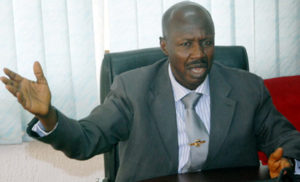 Nigeria’s Economic and Financial Crimes Commission (EFCC) says it has recorded 113 convictions nationwide between January and June, 2017.
Nigeria’s Economic and Financial Crimes Commission (EFCC) says it has recorded 113 convictions nationwide between January and June, 2017.
The Commission’s Acting Chairman, Ibrahim Magu made the disclosure Friday at an interactive meeting with stakeholders in Ikoyi, Lagos – southwest Nigeria.
According to Magu, the feat was made possible by the contributions and support of stakeholders. He vowed not to spare the corrupt despite the prevailing encumbrances.
EFCC’s head of Media and publicity, Wilson Uwujaren, in a statement quoted his boss to have said, “We will not fail to bring to book those who have corruptly stolen our commonwealth and thereafter organize to destabilize the anti corruption initiatives. I will not relent, I will fight… for the interest of our citizens and our children’s future”.
The EFCC boss who observed that corruption was at the root of recent separatist agitations in parts of the country, urged for the joining of forces by all patriots to defeat these tendencies, adding that “we all have a stake in the peaceful co-existence of this nation”.
President, Committee for the Defence of Human Rights (CDHR), Malachy Ugwumadu, described the anti corruption fight not only as a class struggle, but a war that must be won by the people. He said, “This is a class struggle between the political elites and those of us fighting to rescue the soul of our society. The battle may be lost if we don’t reorganize and focus on the people who seem confused due to manipulation by the corrupt few”.
Also speaking, Jiti Ogunye, a lawyer and human rights activist, acknowledged the challenges confronting the anti corruption agencies especially the dangerous environment in which their personnel operate. He sued for encouragement for all anti corruption agencies in order to reduce the pressure on EFCC.
While calling for commitment and synergy among civil society groups, Dr. Joe Odumakin of Women Arise, said “this is not a day to agonize but to organize and put our strategies in focus. Enough of the diversionary tactics employ by those who hate the commission. We must put our house in order, and create more awareness in the communities on the dangers of corruption and how we can mobilize the common people for support”.
Civil society leaders who spoke at the forum called on the Commission to improve its prevention awareness campaign by creating communication strategies that will motivate the masses to join the anti corruption crusade.